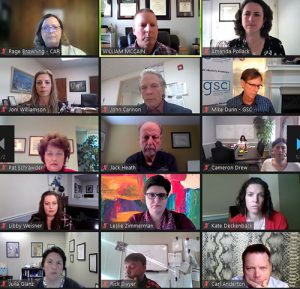
SALISBURY – It was a lengthy discussion on short- and long-term solutions last week as state, county and municipal representatives convened a virtual town hall to address Wicomico’s septic issues.
Last Thursday, the Coastal Association of Realtors (CAR) held a virtual town hall meeting with a panel of state, county and municipal officials to discuss the importance of septic and wastewater systems in Wicomico.
“Over the past few years, the process for replacing and repairing septic systems in Wicomico County has become an extremely lengthy process, and in many cases very costly,” said CAR President Joni Williamson. “We have seen home sales suffer because of these delays, and by tackling this problem head on we hope to prevent a future decline in property values.”
Property owners, real estate agents and developers that participated in last week’s Zoom meeting highlighted the challenges with septic systems in Wicomico. They noted staffing shortages at the county health department have led to months-long permitting delays, and state regulations and soil standards have made it difficult and costly to install and replace systems.
Pat Schrawder, district representative for Sen. Mary Beth Carozza, said two bills in the legislature would address both delays and installation costs. One bill, she noted, established state licensing requirements for septic inspectors, while another allowed the utilization of Bay Restoration Funds to pay the cost of repairing and replacing failing systems.
Officials noted another solution was to tie into municipal water and sewer services.
“Whoever is seeking water and sewer service must extend the services to their property,” said Salisbury Infrastructure and Development Director Amanda Pollack. “The one seeking it would have to sign an annexation or pre-annexation agreement and then pay for the extension of services.”
Councilman Bill McCain told community members that the county is working with George, Miles & Burh (GMB) to complete a countywide water and sewer study. He said it would act as a roadmap to provide sewer to residents outside the municipalities.
“The quickest solution is being able to use sewer capacity that the city has, but we’ve got to get that figured out between the city and the county …,” he said. “Reaching areas that are 10 miles outside the municipalities is going to be a different story, and that’s going to have to be a county system. What that looks like is what they (GMB) will be giving us a roadmap of.”
Julia Glanz, Salisbury’s acting mayor, said the municipality was eager to work with the county.
“The city is a willing partner,” she said. “We want to be part of the solution and that we have to be part of the solution.”
Del. Carl Anderton agreed it needed to be an “all-hands-on-deck” approach.
“The county needs to be partnering with its municipalities …,” he said. “All options should be on the table.”
Greater Salisbury Committee’s Mike Dunn encouraged community members to focus on the bigger picture. He said public infrastructure would allow for new development in Wicomico County.
“A long-term solution here is not septic systems,” he said. “A long-term solution and why Wicomico County is not competing successfully with its neighbor to the north and its neighbor to the east has nothing to do with failing septic systems. It has everything to do with the fact that those counties – Sussex and Worcester – have figured out something that works in terms of a public sewer and water system.”
GMB’s Pete Bozick said Wicomico was the only county not directly involved in the water and sewer business. He noted, however, that the county should view it as a positive and not so much as a negative.
“We want the county to enter into the water and sewer business in the right way,” he said, “taking advantage of the new technologies and taking advantage of collaboration and partnerships with the municipalities.”
County and municipal representatives said they were eager to begin the process of establishing a countywide water and sewer system. Councilman John Cannon, however, said there still needed to be some short-term solutions as it relates to permitting and regulations.
“What’s really important today is to try and look at what we can do to get our health department as efficient as possible right now …,” he said, adding that community concerns should be directed to the Maryland Department of the Environment and the local health department. “I have letters from two years ago with the exact same concerns we have today. It’s two years old. So we need to have a solution.”

